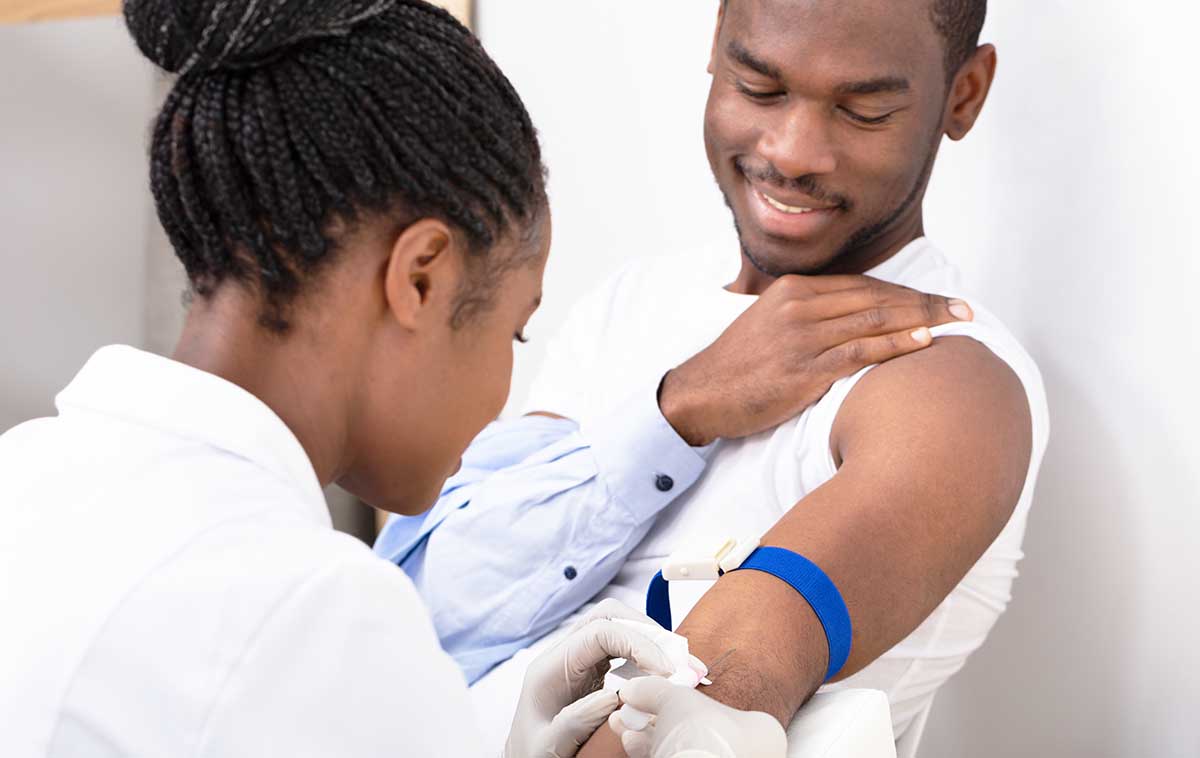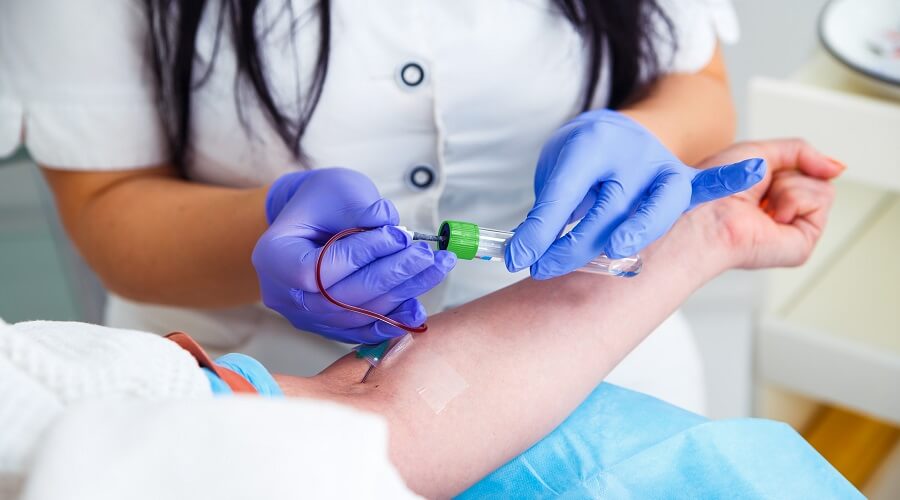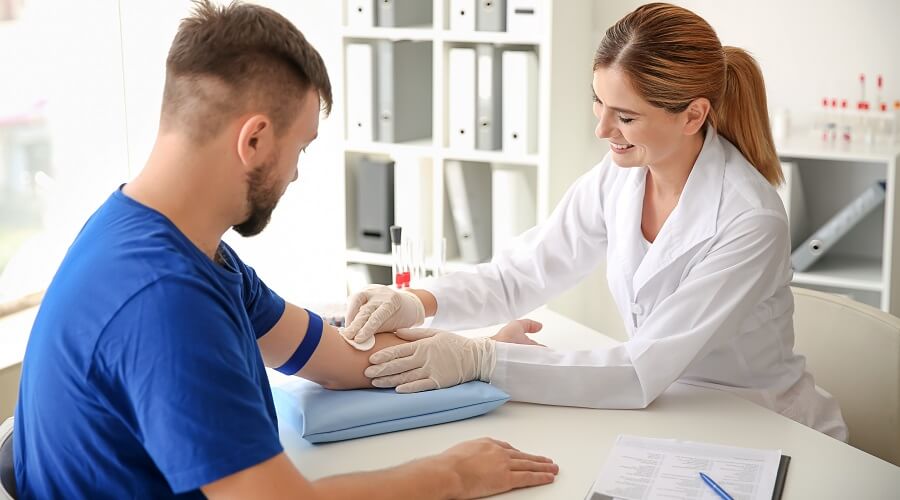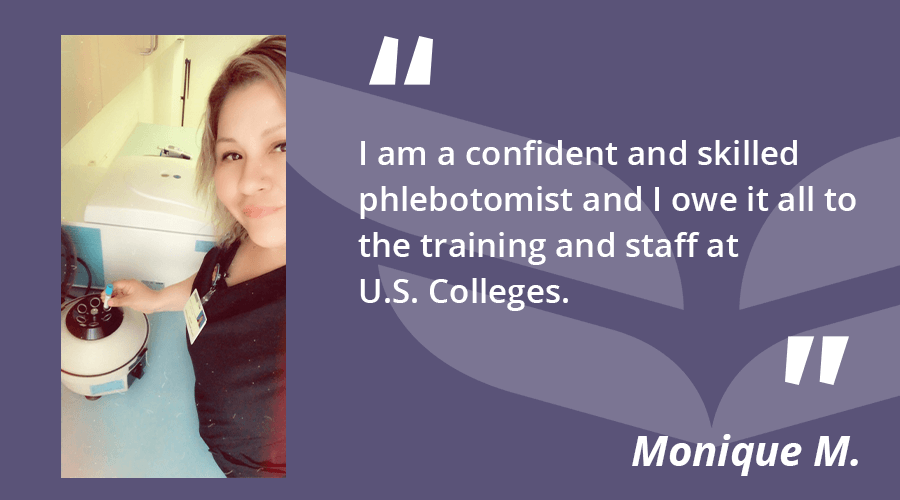Summary
- Duration: 16 weeks
- Day, evening, and weekend classes available
- Lecture and Lab Hours with Hands-On Training
- 40 Hour Externship Opportunity to Practice Your Skills in a Clinical Setting
REQUEST MORE INFORMATION
Ready to Make a Change? Get Started Today! Book a Campus Tour >
Phlebotomy Technician Training Program
The Phlebotomy Technician Program provides students with the knowledge, skills, and hands-on training that they need to succeed in an entry-level career as a Phlebotomy Technician. Primarily, the Program will teach you how to draw blood and handle clinical specimens. The Program will also teach you how to care for patients and ease their anxiety during a blood draw. These are the most important skills covered by our Phlebotomy Technician Course.
Furthermore, the Phlebotomy Technician Program trains students on how to work in clinical labs, hospitals, clinics, or physician offices. It provides instruction on skills, such as proper identification of patients, selection, and preparation of the skin puncture site, blood collection, and post-puncture care, just to name a few.
Our Program also includes an externship that will allow you to work in the Phlebotomy Field, providing you with a chance to be mentored by full-time professionals and interact with real patients in a real-world setting.
Upon completing the Phlebotomy Technician Program, you will be eligible to take a national certification exam by an agency approved by the California Department of Public Health to become a Certified Phlebotomy Technician.
If you’re interested in becoming a Phlebotomist and earning your Phlebotomy Technician Certificate, consider enrolling in our Phlebotomy Technician Training Course. The course can be completed in as little as 16 weeks, placing you on track to beginning a new and rewarding career in phlebotomy.
Summary
- Duration: 16 weeks
- Day, evening, and weekend classes available
- Lecture and Lab Hours with Hands-On Training
- 40 Hour Externship Opportunity to Practice Your Skills in a Clinical Setting
Skills You Will Learn
The Phlebotomy Technician Course covers the following topics and skills:
- Proper identification of sites
- Skin preparation for blood draws
- Introduction to blood collection equipment
- Familiarity with the different types of tubes and additives
- Specimen transportation, processing, and storage
- Post-puncture care
- Needle & sharp item disposal
- Infectious disease control
- Blood specimen processing
- Basic communication and professional behavior
- Mandatory externship
- Performing 50 successful venipunctures
- Performing 10 successful skin punctures
Phlebotomy Technician Career Outcomes
It can be exciting training for a new career! U.S. Colleges wants you to know that once you become a Phlebotomist Technician, you can work in clinical labs, hospitals, nursing homes, physician’s offices, and more.
As a graduate of the program, you may qualify for the following positions:
- Phlebotomist
- Lab Assistant
- Medical Lab Assistant
- Accessioner
- Lab Specimen Processor
- Mobile Phlebotomist
- Floor Technician
- Clinical Assistant
- Research Assistant
- Health Screener
- Medical Assistant
About the Phlebotomy Technician Program
The Phlebotomy Technician Training Program trains students on how to collect, transport, and handle lab specimens. The Program will also teach you how to ease patients’ phobias when it comes to needles and blood. Furthermore, you will be able to put your knowledge and skills to practice with hands-on training. Gaining this invaluable experience will prepare you for a career as an entry-level phlebotomy technician.
If you’re ready to take the next step and train for a career in the phlebotomy field, consider enrolling in U.S College’s Phlebotomy Technician Training Program. The Program can be completed in 16 weeks, placing you on track to becoming a Phlebotomy Technician.
Enrollment is offered on a monthly basis, allowing you to begin training for a new career in less than a month. Contact us, and one of our admissions professionals will provide you with all of the information that you need to enroll in our Phlebotomy Technician Program.
Students who complete U.S College’s Phlebotomy Course will receive a Phlebotomy Technician I Certificate, making them eligible to sit for a national phlebotomy exam administered by an agency approved by the California Department of Public Health.
Course Titles
Hours
Phlebotomy Practice and Healthcare settings, Proper Identification and Preparation of Site, Post Puncture Care, Disposal of Sharps, Needles, Biohazardous Waste, Instructions to Client, Infection Control
8
Basic Anatomy and Physiology of Organ Systems
8
Basic Anatomy and Physiology of Organ Systems: Circulatory System (Continued) & Phlebotomy Equipment
8
Phlebotomy Technique
8
Phlebotomy Technique (Continued) & Challenge of Phlebotomy Lecture, Basic Final Exam & Venipuncture Lab
8
Caring for the Pediatric Patient
8
Sample Considerations and Special Procedures
8
Sample Preparation and Handling and Customer Services
8
Compliance, Legal, and Ethical Issues & Competency Lecture
8
Practical Assessment and Final Exam
6
Mandatory Externship
40
Classes Starting May 25th, 2024!¶
Phlebotomy Program FAQs
Phlebotomy Technicians perform various duties in a healthcare setting, including blood draws, monitoring patients, educating patients, identifying specimen samples, and assisting healthcare professionals.
Resources
How to Become a Phlebotomy Technician in California
Interested in pursuing a career as a phlebotomy technician? This step by step guide will provide you with the necessary steps to become a Certified Phlebotomy Technician in California.
How Long Does It Take To Become Phlebotomy Technician?
Learn how you can become a phlebotomy technician in as few as 16 weeks with Phlebotomy Training at US Colleges.






